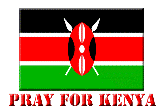Uhuru Kenyatta is the president of Kenya.
I hope he can deliver for the next five years.
Will history repeat itself with another Kenyatta presidency?
Time will tell.
Related article: Raila Odinga to continue the struggle peacefully
May Justice be our shield and defender.
Update
Related article Kenya's quiet court ruling where was Willy
I hope he can deliver for the next five years.
Will history repeat itself with another Kenyatta presidency?
Time will tell.
Related article: Raila Odinga to continue the struggle peacefully
May Justice be our shield and defender.
Update
Related article Kenya's quiet court ruling where was Willy





